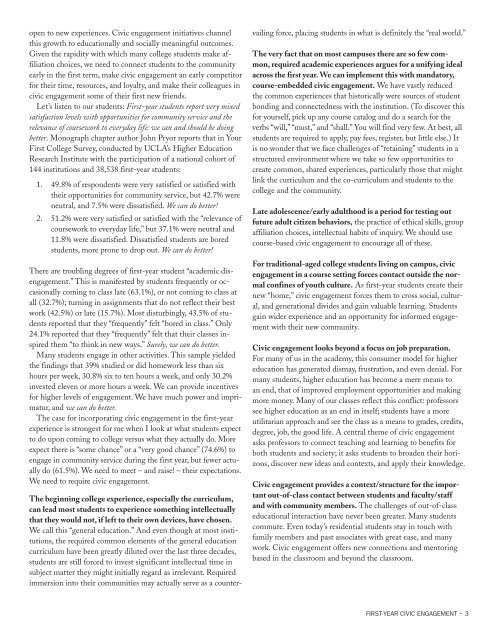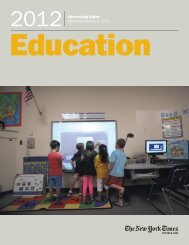we had the “great flood” of the Ohio. In 1963, many of thecollege’s students mobilized to help the riverfront merchantssandbag and save their properties. Beyond this ef<strong>for</strong>t, most of uswere not particularly involved with the local community duringour time at Marietta.By the end of my college years, in 1965, some of us were volunteeringto serve our country in the escalating war in Vietnam.I decided to go to graduate school, rather than attend seminary,or work <strong>for</strong> a defense contractor, or get married — all ways toearn a draft deferment. But the draft got me anyway, and I wasintroduced to civic engagement of a sort never envisioned by mycollege.My introduction came from my Air Force squadron commander,of the 363rd Tactical Hospital at Shaw AFB, South Carolina. Ihad been on my new base not even 48 hours when he called meinto his office <strong>for</strong> a <strong>for</strong>mal interview and in<strong>for</strong>med me that hehad reviewed my records: “Gardner, except <strong>for</strong> the physicians,you have more education than anyone on this squadron. The AirForce needs college teachers and so I want you to do some collegeteaching.” I in<strong>for</strong>med him that I had never done any collegeteaching and had never intended to do any. He was dismissiveand in<strong>for</strong>med me that “the Air Force believes in the importanceof per<strong>for</strong>ming public service” and that’s all there was to that.Two weeks later, I found myself in a college classroom, thistime as a part-time adjunct instructor. Soon I was loving it andwithin several months had an epiphany: I had found my vocation— a way not only to earn a legal living, but also to be paid toread, write, talk, and help people — the four things I love to dothe most.I often reflect on how different my college experience mighthave been had Marietta then taken responsibility <strong>for</strong> getting mecivically engaged, as it does now, especially with its “Leadership”students. So I return to my question: what if by design, our collegesintroduced students to civic engagement? Some of us facultywant to repeat <strong>for</strong> students what was done <strong>for</strong> and to us. Some ofus want to do it differently. I want to do it differently — to ensurethat we intentionally introduce students to civic engagement andpublic service.The <strong>First</strong>-<strong>Year</strong> Experience NowToday we use the term “first-year experience” to mean a particularprogrammatic intervention to improve the retention and successof new college students. When I use this phrase, I use it not in thenarrower context of one “program,” and certainly not to describeone particular program, the first-year seminar. When I write about“the first-year experience,” I am talking about the totality of everythinga campus does to, with, and <strong>for</strong> its new students.The first-year seminar, though, as part of the first-year experience,is related to our focus on civic engagement. Found in some<strong>for</strong>m in 94% of the accredited, undergraduate degrees (PolicyCenter on the <strong>First</strong> <strong>Year</strong> of <strong>College</strong>, 2002), the first-year seminarprovides the opportunity <strong>for</strong> faculty leadership, a support group offellow students, and a desirable introduction to the <strong>for</strong>mal learningprocesses of students and the programs of the institution. Ithas become one of the most ubiquitous delivery mechanisms <strong>for</strong>integrating students into their new college community. The seminaris an ideal site <strong>for</strong> integrating civic engagement.Why the <strong>First</strong> <strong>Year</strong> MattersTo make the case <strong>for</strong> first-year civic engagement, we need first tomake the case <strong>for</strong> paying more attention, ef<strong>for</strong>t, time, resources,and credit, to the beginning college experience. From an educational,human, and societal paradigm, we see a number of compellingreasons <strong>for</strong> the importance of the first year. The first year ofcollege is the foundation <strong>for</strong> students’ undergraduate careers. Thedecisions and activities of the first year determine students’ successat the beginning of college and build a foundation <strong>for</strong> success inthe remaining years. These decisions and activities include:(a) learning how to learn in college, collegiate study, test-takingskills, and critical thinking;(b) appreciating the liberal arts and general education;(c) choosing a major (and perhaps a career);(d) developing time management; understanding “economiesof time”; increasing the levels of time, attention, and energygiven to college work;(e) earning a good grade point average, so essential to maintainingfinancial aid, “satisfactory progress,” athletic eligibility,family support, and self-respect;(f ) developing positive attitudes towards faculty and mentors,learning to interact with them outside of class (a key behaviorin facilitating retention);(g) developing positive attitudes towards the campus (the basisof levels of student satisfaction);(h) developing relationships that will last a lifetime and influencevalues and life choices;(i) deciding which groups to affiliate with (with importantimpacts on behavioral choices);(j) making choices about behaviors that endure long after college— behaviors affecting areas as diverse as overall healthand wellness (e.g., drinking and eating habits, engaging insexual activity) and civic engagement (e.g., service, voting,being politically active).The first college year provides the opportunity to introducestudents to the kinds of thinking and experiences that the institutionvalues — including, importantly, civic engagement. Italso provides an important baseline <strong>for</strong> assessing how effectivehigher education initiatives are in instilling the values institutionsespouse. Understanding the entering characteristics of studentsprovides a basis <strong>for</strong> measuring long-term change and value-addededucation.The Case <strong>for</strong> Requiring <strong>Civic</strong> <strong>Engagement</strong> in the <strong>First</strong> <strong>Year</strong>As George Mehaffy writes in this monograph, the first year is atime of “experimentation and discovery.” Students begin college
open to new experiences. <strong>Civic</strong> engagement initiatives channelthis growth to educationally and socially meaningful outcomes.Given the rapidity with which many college students make affiliationchoices, we need to connect students to the communityearly in the first term, make civic engagement an early competitor<strong>for</strong> their time, resources, and loyalty, and make their colleagues incivic engagement some of their first new friends.Let’s listen to our students: <strong>First</strong>-year students report very mixedsatisfaction levels with opportunities <strong>for</strong> community service and therelevance of coursework to everyday life: we can and should be doingbetter. Monograph chapter author John Pryor reports that in Your<strong>First</strong> <strong>College</strong> Survey, conducted by UCLA’s Higher EducationResearch Institute with the participation of a national cohort of144 institutions and 38,538 first-year students:1. 49.8% of respondents were very satisfied or satisfied withtheir opportunities <strong>for</strong> community service, but 42.7% wereneutral, and 7.5% were dissatisfied. We can do better!2. 51.2% were very satisfied or satisfied with the “relevance ofcoursework to everyday life,” but 37.1% were neutral and11.8% were dissatisfied. Dissatisfied students are boredstudents, more prone to drop out. We can do better!There are troubling degrees of first-year student “academic disengagement.”This is manifested by students frequently or occasionallycoming to class late (63.1%), or not coming to class atall (32.7%); turning in assignments that do not reflect their bestwork (42.5%) or late (15.7%). Most disturbingly, 43.5% of studentsreported that they “frequently” felt “bored in class.” Only24.1% reported that they “frequently” felt that their classes inspiredthem “to think in new ways.” Surely, we can do better.Many students engage in other activities. This sample yieldedthe findings that 39% studied or did homework less than sixhours per week, 30.8% six to ten hours a week, and only 30.2%invested eleven or more hours a week. We can provide incentives<strong>for</strong> higher levels of engagement. We have much power and imprimatur,and we can do better.The case <strong>for</strong> incorporating civic engagement in the first-yearexperience is strongest <strong>for</strong> me when I look at what students expectto do upon coming to college versus what they actually do. Moreexpect there is “some chance” or a “very good chance” (74.6%) toengage in community service during the first year, but fewer actuallydo (61.5%). We need to meet – and raise! – their expectations.We need to require civic engagement.The beginning college experience, especially the curriculum,can lead most students to experience something intellectuallythat they would not, if left to their own devices, have chosen.We call this “general education.” And even though at most institutions,the required common elements of the general educationcurriculum have been greatly diluted over the last three decades,students are still <strong>for</strong>ced to invest significant intellectual time insubject matter they might initially regard as irrelevant. Requiredimmersion into their communities may actually serve as a countervailing<strong>for</strong>ce, placing students in what is definitely the “real world.”The very fact that on most campuses there are so few common,required academic experiences argues <strong>for</strong> a unifying idealacross the first year. We can implement this with mandatory,course-embedded civic engagement. We have vastly reducedthe common experiences that historically were sources of studentbonding and connectedness with the institution. (To discover this<strong>for</strong> yourself, pick up any course catalog and do a search <strong>for</strong> theverbs “will,” “must,” and “shall.” You will find very few. At best, allstudents are required to apply, pay fees, register, but little else.) Itis no wonder that we face challenges of “retaining” students in astructured environment where we take so few opportunities tocreate common, shared experiences, particularly those that mightlink the curriculum and the co-curriculum and students to thecollege and the community.Late adolescence/early adulthood is a period <strong>for</strong> testing outfuture adult citizen behaviors, the practice of ethical skills, groupaffiliation choices, intellectual habits of inquiry. We should usecourse-based civic engagement to encourage all of these.For traditional-aged college students living on campus, civicengagement in a course setting <strong>for</strong>ces contact outside the normalconfines of youth culture. As first-year students create theirnew “home,” civic engagement <strong>for</strong>ces them to cross social, cultural,and generational divides and gain valuable learning. Studentsgain wider experience and an opportunity <strong>for</strong> in<strong>for</strong>med engagementwith their new community.<strong>Civic</strong> engagement looks beyond a focus on job preparation.For many of us in the academy, this consumer model <strong>for</strong> highereducation has generated dismay, frustration, and even denial. Formany students, higher education has become a mere means toan end, that of improved employment opportunities and makingmore money. Many of our classes reflect this conflict: professorssee higher education as an end in itself; students have a moreutilitarian approach and see the class as a means to grades, credits,degree, job, the good life. A central theme of civic engagementasks professors to connect teaching and learning to benefits <strong>for</strong>both students and society; it asks students to broaden their horizons,discover new ideas and contexts, and apply their knowledge.<strong>Civic</strong> engagement provides a context/structure <strong>for</strong> the importantout-of-class contact between students and faculty/staffand with community members. The challenges of out-of-classeducational interaction have never been greater. Many studentscommute. Even today’s residential students stay in touch withfamily members and past associates with great ease, and manywork. <strong>Civic</strong> engagement offers new connections and mentoringbased in the classroom and beyond the classroom.
- Page 1: First-Year Civic Engagement:Sound F
- Page 5 and 6: CONTENTSivPrefaceMartha J. LaBare,
- Page 7: Zlotkowski, Edward, ed. (2002). Ser
- Page 12 and 13: Requiring civic engagement demonstr
- Page 14 and 15: The preparation of citizens was one
- Page 16 and 17: preparation. At its heart, this wor
- Page 18 and 19: in it of particular interest to tho
- Page 20 and 21: often in tension. Political partici
- Page 22 and 23: educating students for active citiz
- Page 24 and 25: CHAPTER 4Civic Learning: Aligning P
- Page 26 and 27: Faces/Phases of CitizenshipFace/Pha
- Page 28 and 29: ecome more informed and participate
- Page 30 and 31: ReferencesAstin, A.W., Vogelgesang,
- Page 32 and 33: photography techniques to inmates a
- Page 34 and 35: CHAPTER 8Action Steps to Move theFi
- Page 36 and 37: ConclusionI wish to be very clear t
- Page 38 and 39: CASE STUDYALLEGHENY COLLEGECivic En
- Page 40 and 41: CASE STUDYANTIOCH COLLEGECivic Enga
- Page 42 and 43: CASE STUDYCALIFORNIA STATE UNIVERSI
- Page 44 and 45: CASE STUDYCALIFORNIA STATE UNIVERSI
- Page 46 and 47: CASE STUDYCHANDLER-GILBERT COMMUNIT
- Page 48 and 49: CGCC Global Engagement:http://www.c
- Page 50 and 51: student blog in which students are
- Page 52 and 53: CASE STUDYTHE COLLEGE OF NEW JERSEY
- Page 54 and 55: I. Contributors’ Names and Contac
- Page 56 and 57: opportunities of CSU students and C
- Page 58 and 59: needs, and expectations of the serv
- Page 60 and 61:
Although Times Talk began in Septem
- Page 62 and 63:
CASE STUDYFRANKLIN PIERCE UNIVERSIT
- Page 64 and 65:
We now have a comprehensive assessm
- Page 66 and 67:
Another major assignment for this c
- Page 68 and 69:
CASE STUDYHAMPDEN-SYDNEY COLLEGELiv
- Page 70 and 71:
I. Contributors’ Names and Contac
- Page 72 and 73:
Qualitative assessment begins with
- Page 74 and 75:
3. Lessons in Democracy. The IUPUI
- Page 76 and 77:
CASE STUDYLEHIGH UNIVERSITYJudging
- Page 78 and 79:
CASE STUDYMARS HILL COLLEGELifeWork
- Page 80 and 81:
CASE STUDYMERCER UNIVERSITYInterdis
- Page 82 and 83:
CASE STUDYMICHIGAN STATE UNIVERSITY
- Page 84 and 85:
CASE STUDYPACE UNIVERSITYCivic Enga
- Page 86 and 87:
Susan-Feather GannonProfessor, Tech
- Page 88 and 89:
AssessmentData were gathered from s
- Page 90 and 91:
CASE STUDYPITZER COLLEGEThe Communi
- Page 92 and 93:
from people different from themselv
- Page 94 and 95:
Table 1Summary of the Major Outcome
- Page 96 and 97:
engaged stewards of the environment
- Page 98 and 99:
HIV-positive individuals. They also
- Page 100 and 101:
Students were then equipped to eval
- Page 102 and 103:
the World Affairs Council (WAC), in
- Page 104 and 105:
CASE STUDYTRINITY UNIVERSITYCivic E
- Page 106 and 107:
I. Contributors’ Names and Contac
- Page 108 and 109:
in the organization of health care
- Page 110 and 111:
study and a series of retreats as p
- Page 112 and 113:
ing based opportunities. Both semes
- Page 114 and 115:
engaging first-year students and st
- Page 116 and 117:
CASE STUDYWEBER STATE UNIVERSITY CO







